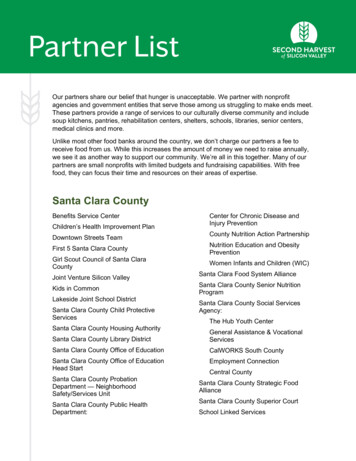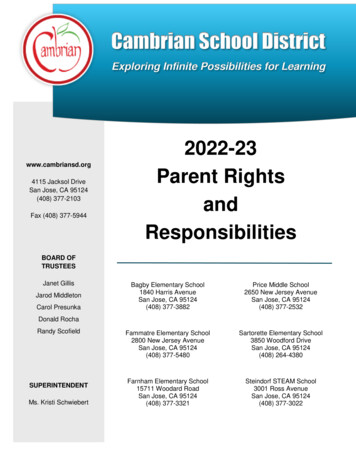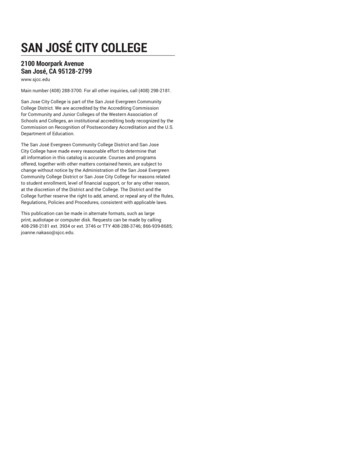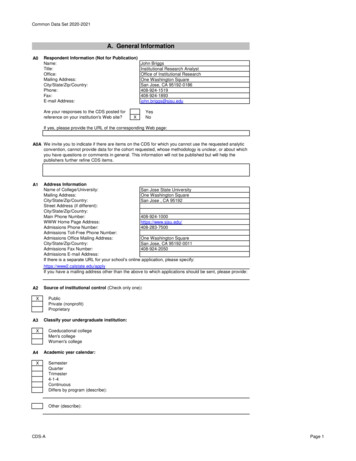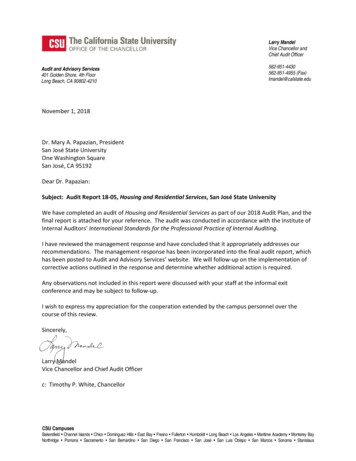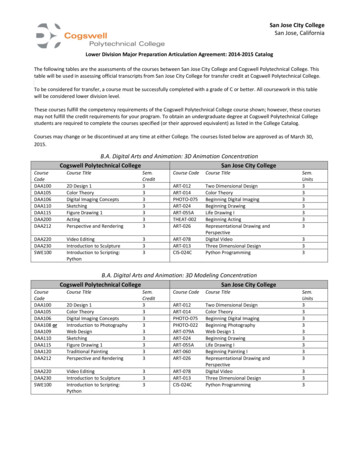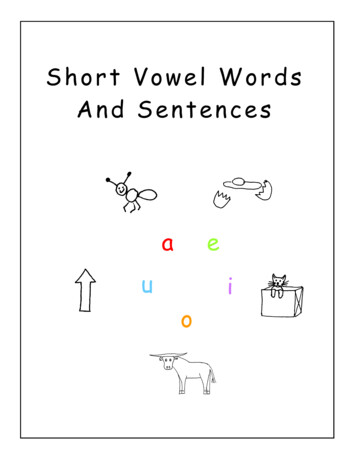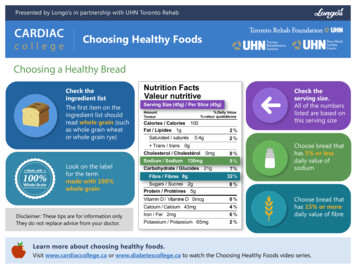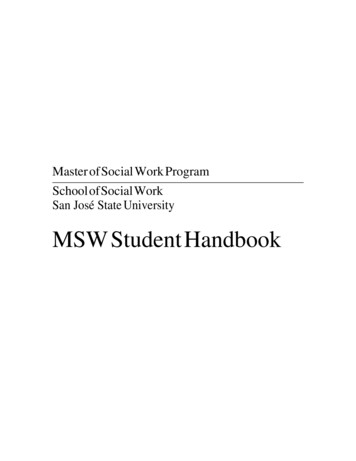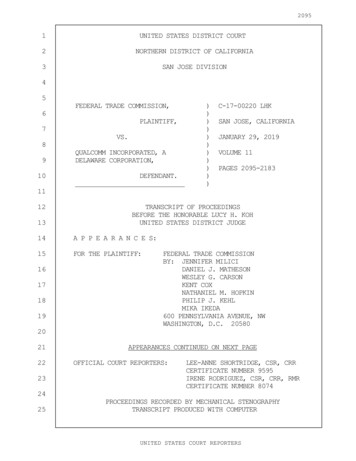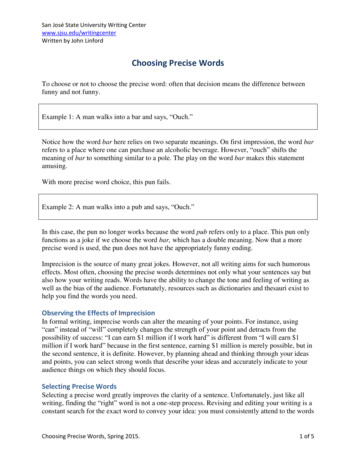
Transcription
San José State University Writing Centerwww.sjsu.edu/writingcenterWritten by John LinfordChoosing Precise WordsTo choose or not to choose the precise word: often that decision means the difference betweenfunny and not funny.Example 1: A man walks into a bar and says, “Ouch.”Notice how the word bar here relies on two separate meanings. On first impression, the word barrefers to a place where one can purchase an alcoholic beverage. However, “ouch” shifts themeaning of bar to something similar to a pole. The play on the word bar makes this statementamusing.With more precise word choice, this pun fails.Example 2: A man walks into a pub and says, “Ouch.”In this case, the pun no longer works because the word pub refers only to a place. This pun onlyfunctions as a joke if we choose the word bar, which has a double meaning. Now that a moreprecise word is used, the pun does not have the appropriately funny ending.Imprecision is the source of many great jokes. However, not all writing aims for such humorouseffects. Most often, choosing the precise words determines not only what your sentences say butalso how your writing reads. Words have the ability to change the tone and feeling of writing aswell as the bias of the audience. Fortunately, resources such as dictionaries and thesauri exist tohelp you find the words you need.Observing the Effects of ImprecisionIn formal writing, imprecise words can alter the meaning of your points. For instance, using“can” instead of “will” completely changes the strength of your point and detracts from thepossibility of success: “I can earn 1 million if I work hard” is different from “I will earn 1million if I work hard” because in the first sentence, earning 1 million is merely possible, but inthe second sentence, it is definite. However, by planning ahead and thinking through your ideasand points, you can select strong words that describe your ideas and accurately indicate to youraudience things on which they should focus.Selecting Precise WordsSelecting a precise word greatly improves the clarity of a sentence. Unfortunately, just like allwriting, finding the “right” word is not a one-step process. Revising and editing your writing is aconstant search for the exact word to convey your idea: you must consistently attend to the wordsChoosing Precise Words, Spring 2015.1 of 5
you are using. Indeed, each step in the writing process gives you another opportunity to clarifywhat you mean and hone your words.Readers use words to identify who is doing the action and what action is happening. Nouns namecharacters. Verbs name actions. Together they control the core meaning of any sentence. Whenediting your work it pays to focus your attention on the nouns and verbs that control these focalelements of your sentences.CharactersYou are writing your status report for your Business Management project. The people readingyour work may know the general outlines of the project, but they will have less information thanyou do as they try to track who is doing what on the project. You will need to use precise, fleshand-blood characters as subjects to describe the work completed. For instance, instead ofreferring to “my boss,” you might say “my manager” or “my supervisor.” Manager andsupervisor are more specific than boss. Even more specific would be the name of your boss.On the other hand, the difference between manager and supervisor could be irrelevant to youraudience in this report. Part of selecting a precise word revolves around the detail your audienceneeds to know. Is the title of your superior relevant to the point you are trying to make? Does itchange the understanding of your idea if you use a more general term? Would it help to use thename. Will the audience know your boss by name?It would be simple if we could tell you to always use the most specific word. However,depending on the situation, selecting “my boss” could work just fine. For instance, if the mainpoint of the sentence did not focus on your boss’s management or supervision, but on therelationship between the two of you in the general hierarchy, using “my boss” instead of a morespecific title to indicate her role might work well. But if managing rather than supervising playsa crucial role in a paragraph or sentence, a more specific title would work better because it willlocate for your audience the specific—precise—relationship on the organization chart in thebusiness.Shown below is an easy way to map out your rhetorical choices for words as they map onto a“ladder of abstraction” from general to specific. You choose the best word for the actualaudience and context of the writing you are doing.Choosing Precise Words, Spring 2015.2 of 5
Notice how the bottom of the diagram asks, “Is it important to see this?” If this is the only timewe hear about your boss, or if we are unfamiliar with her name, it will likely suffice to say “myboss.” In contrast, if your audience knows people by name on this project, it might make sense touse her name so that readers can name the specific actor they will recognize in the role.Similarly, using a more specific title could have the benefit, in context, of showing theimportance of the encounter: your CEO recognizing your work is probably more significant tothe status of the project than your supervisor doing the same.ActionsThe actions you choose dictate the tone and feeling of your writing because they control theimages we create in our minds. Consider the differences in these sentences.I got an award last night.I won an award last night.I found an award last night.Notice how changing the action word completely changes the meaning of the sentence andconjures a completely different image. “Got” is not a specific action, so it is not easy to pictureexactly what happened: reading got, I could easily picture either “won” or “found,” forinstance—two incredibly different images.Let’s return to the sentence “My boss recognized my work during the meeting.” Notice that eachof the more specific verbs creates a different picture in your mind. That is one of the effects ofchoosing precise words—nouns or verbs. The more specific the words, the more concrete theimage. What image do you see in each of these options?My boss praised my work.My boss identified my work.My boss noticed my work.My boss awarded my work.My boss applauded my work.Given these options, the question becomes: what do you want me to see when I read the wordrecognized? There are several possibilities. “Recognized” is not a clear verb; however, as youwill notice in the diagram, attempting to make the verb too specific could result in an entirelydifferent meaning than you originally intended.Choosing Precise Words, Spring 2015.3 of 5
In this case, “praised” would most likely be the best choice. Going beyond “praised” could betoo much information for your audience or even make your sentence incorrect: “awarded” is anentirely different concept from “praised,” but “awarded” appears in a thesaurus as a synonym for“praised.”Using a Dictionary and ThesaurusA thesaurus and dictionary are meant to work together. Although a thesaurus can offer manyexcellent options for better or more precise words, the thesaurus only names synonyms andrelated words; it does not provide lists of words with the exact same meaning. You have tochoose precisely to maintain your original meaning, so you must check each synonym in thedictionary. It may be tempting to skip checking, but you can never be sure of your choice untilyou check.For instance, thesaurus.com lists trip as a synonym for flight, which is defined as “the act,manner, or power of flying.” The word trip, though, means “a journey or voyage.” Clearly, thesetwo words are not interchangeable in many situations. Fortunately, online thesauri anddictionaries make the process of checking definitions easy.ActivityRewrite the following sentences with more precise words by replacing vague words with specificwords to create two different but specific and unambiguous scenes. Map your choices onto a“ladder of abstraction” Use a thesaurus and a dictionary to help you build a rich set of choices.Discuss the results with your tutor.Sample:The man touched me.a. The comedian made the blood rush to my cheeks and moved me to teary laughter.b. My dad pinched my cheek.1. My boss had me to go to the store to get stuff for our work.a.b.Choosing Precise Words, Spring 2015.4 of 5
2. Yesterday, I got some interesting candies from a guy.a.b.3. Something about that day was enough to make me scream.a.b.ReferencesLunsford, Andrea. The Everyday Writer. 5th Edition. Boston: Bedford/St. Martins, 2013. Print."Online Reference Sources." Home. Dr. Martin Luther King, Jr. Library. Web. 29 Mar. 2015. http://libguides.sjsu.edu/content.php?pid 57995&sid 428122 .Williams, Joseph M., and Joseph Bizup. Style: Lessons in Clarity and Grace. 11th Edition.Pearson Education, 2014. Print.Choosing Precise Words, Spring 2015.5 of 5
Choosing Precise Words, Spring 2015. 4 of 5 In this case, "praised" would most likely be the best choice. Going beyond "praised" could be too much information for your audience or even make your sentence incorrect: "awarded" is an entirely different concept from "praised," but "awarded" appears in a thesaurus as a synonym for

